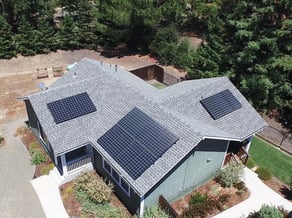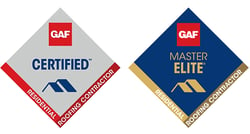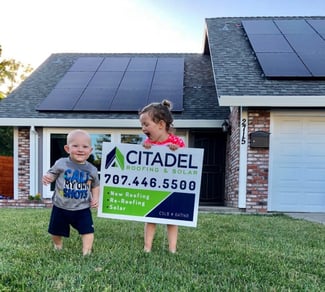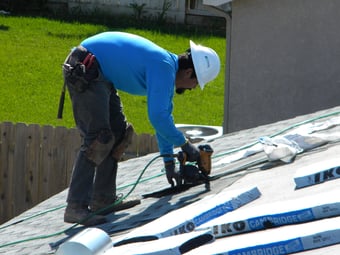You’ve probably heard the mattress advertisements saying you spend one-third of your life in bed, making a quality mattress worth the investment.
Now, think about your roof. Your roof helps keep you warm (or cool), dry, and safe 24/7. It protects your loved ones, the structure of your home, and all the valuables within your home. So when you spend the cost of roughly 5-10 mattresses for a new roof, it feels like a worthwhile and necessary investment.
Perhaps you’re also considering investing in a solar energy system. Maybe it’s because you’re interested in…
- Paying lower, more consistent electricity bills
- Gaining some independence from your utility company
- Producing clean, environmentally friendly energy
New roofs and solar energy systems are significant investments, so you need to know how to protect those investments. In particular, you should understand how roofers can impact your solar warranty, and how solar can impact your roof warranty.
We at Citadel Roofing & Solar have installed tens of thousands of new roofs for California homeowners and homebuilders, and thousands of solar energy systems.
In our over 30 years of experience, we’ve truly seen and done it all. Sometimes, this includes fixing the work of other installers. Sadly, this can involve unnecessary damage to roofs and solar energy systems. This costs homeowners a lot of money, time, and frustration.
In this blog post, we’ll explore:
- Types of roof warranties
- Types of solar warranties
- Whether solar voids a roof warranty
- Whether roofers void a solar warranty
- How to protect your solar and roofing warranties
Here’s what we’ve learned over the years, and some tips for how you can protect your family and your investment.
The 2 Types of Roof Warranties
A new roof typically comes with two types of warranties:

- A workmanship warranty – Workmanship warranties are provided by the installation company. These cover installation errors.
For example, we provide a 10-year workmanship warranty on our roof installations. - A materials warranty – Materials warranties are provided by the manufacturer of the tiles, shingles, or other roofing products. If the product proves to be defective, it will be replaced at no cost to the homeowner, provided it was installed correctly by the roofing contractor.
The length of materials warranties vary. Homeowners often buy extended warranties from the roofing product manufacturer to provide peace of mind and to increase the home’s resale value.
Look for This in a Roofer
It’s a great sign if your roofer is certified to sell high-quality roofing products and offers extended warranties through the manufacturer. This is because high-quality roofing product manufacturers only certify roofing installation companies whose work they trust.
Developing this trust often involves a rigorous auditing process. They don’t want to put their name, reputation, and money behind inferior workmanship that won’t last. The more trust they have in a roofer, the higher-level warranty that roofer can offer its customers.
For example, we at Citadel are trained and certified to install all top-of-the-line roofing systems, and to offer their high-level warranties to our roofing customers. This includes an up-to-25-year extended workmanship warranty.
 We are a Platinum Preferred Contractor with Owens Corning and a Select ShingleMaster with CertainTeed. These are the manufacturers’ most selective certification levels. We are also certified by the Tile Roofing Institute (TRI) for roof tile installations. Plus, we are certified as a Master Elite roofer by GAF Roofing (which only 2% of North American roofers can claim) and received their Training Excellence Award.
We are a Platinum Preferred Contractor with Owens Corning and a Select ShingleMaster with CertainTeed. These are the manufacturers’ most selective certification levels. We are also certified by the Tile Roofing Institute (TRI) for roof tile installations. Plus, we are certified as a Master Elite roofer by GAF Roofing (which only 2% of North American roofers can claim) and received their Training Excellence Award.
The 3 Types of Solar Warranties
 A solar electric system typically comes with several types of warranties:
A solar electric system typically comes with several types of warranties:
- A workmanship warranty – These warranties are provided by the solar installation company.
For example, we at Citadel provide a 10-year workmanship warranty on our solar projects. - Materials warranties – These are provided by the equipment manufacturers—those who produce the solar panels, inverters, racking system, solar batteries, and other parts that make up a solar energy system.
Also called equipment warranties, these protect you against defects in their products. They may last up to 20 years. - Power production warranties – Power production warranties are offered by most solar panel manufacturers. It’s normal for solar panel production to decrease slightly over time. This warranty guarantees that your panels will retain a certain amount of generating capacity over the years.
In most cases, solar panel installation involves drilling dozens of holes into your roof so the racking system and panels can be attached properly.
Don’t panic. We know it sounds risky, but leaks won’t occur if the installation is performed by a qualified, experienced company using industry-leading methods and flashings (waterproofing materials) to seal the holes. Just ask the tens of thousands of people currently enjoying solar energy with no damage to their homes whatsoever.
However, even the best solar installation company can sometimes make a mistake. That’s where the warranties come in. They protect you against unexpected damage caused by the solar installer.
And if you’re not sure how experienced or qualified your installer is, warranty protection is critical. That’s why it’s important to work with a solar installer that provides comprehensive warranty protection.
So if a solar installer doesn’t offer great warranties—or worse, if they aren’t even transparent about what they do offer—reach out to us at Citadel for your California home solar installation instead.
Will Solar Panels Void My Roof Warranty?
In most cases, a solar energy system will not void your roof warranty. This is true if the solar panels and their racking are installed by a qualified solar company according to the manufacturer’s specifications.
In fact, solar panels can actually extend the life of your roof—at least the section of roof underneath them. The panels take the brunt of the heat, wind, rain, and potentially snow that pummels your roof tiles or shingles throughout the year, protecting the roof below.
However, if the solar company does not adhere to the manufacturer’s specifications—whether due to lack of training or lack of care—your roof warranty may be voided. We at Citadel Roofing & Solar have seen this too many times: Roofs damaged by solar installers who are unaware of (or indifferent to) how fragile roof materials are.
Solar installation does void roof warranties when installation errors are made. Common examples of this include:
- An installer negligently causing damage to the roof
- Use of improper installation methods or equipment
- Incorrect installation of flashings at the roof penetrations
You wouldn’t expect a contractor to scratch up your newly installed wooden floor and get away with it. Perhaps some solar installers think that because the roof is largely out of sight, any damage doesn’t matter or at least won’t be noticed.
It's especially frustrating to us at Citadel because when we put solar on a home, we know what the roof can and cannot withstand. And unlike many solar installers, we never install solar on an old, dilapidated roof. But many contractors don’t know or don’t care how to mitigate risks to a roof when installing solar.
In the end, it’s the homeowner who pays, sometimes finding their 25- or 50-year roof warranty null and void due to the carelessness of the solar installation crew.
Read on for tips on how to best protect yourself, your roof, and your roof warranty during your solar panel installation.
Can Roofers Affect My Solar Warranty?
Yes, roofers can affect your solar warranty.
A roofing contractor damaging your solar energy system is less likely than a solar contractor damaging your roof, but it can and does happen. If your roof needs repairs and you have solar on your roof, a little preventative medicine will go a long way (see “How to Keep Your Roofing and Solar Warranties Intact” below).
Be aware that many solar installers do permit anyone—homeowner or other contractor—to remove, fix, or otherwise touch the solar equipment on your roof. If that occurs, your solar workmanship warranty is very likely to become null and void.
It makes sense. Citadel’s solar Workmanship Warranty puts our craftsmanship, name, and money on the line. We are responsible for our work and we know our quality is top-notch. But if someone else messes with our work, we don’t know what they’ve done—what they might have moved, disconnected, or otherwise damaged. And that means we can no longer vouch for the integrity of the solar electric system or offer a Workmanship Warranty to you.
Read on for easy ways to protect against a roofer damaging your solar system.
The Solution: Use a Single Vendor
 Citadel Roofing & Solar has been installing and repairing roofs for years. One reason we entered the solar business was our frustration with the shoddy workmanship we saw by other solar companies when we were called out to make repairs for our roofing customers.
Citadel Roofing & Solar has been installing and repairing roofs for years. One reason we entered the solar business was our frustration with the shoddy workmanship we saw by other solar companies when we were called out to make repairs for our roofing customers.
If you want to install solar (with or without a new roof) we highly recommend hiring a contractor that does both solar and roofs. Even if you don’t need a roof, you can rest assured that your solar company knows how to work on your home without compromising your roof.
And should something unwanted happen—a scuffed shingle or cracked tile—there won’t be any finger-pointing between the two contractors, because you’ll only have one. A combined roofing and solar company can easily fix any damage to the roof.
If your roof needs repairs in the future, you won’t have to worry about the roofing crew voiding your solar warranty when they work around the panels and wiring.
By working with a contractor like Citadel, you get one company backing the warranties for your roof and your solar. This provides the comprehensive coverage you need to protect your valuable home investments.
How to Keep Your Roofing and Solar Warranties Intact
Here are some tips for protecting yourself and getting the most out of your roofing and solar investment.
If you are having a new roof installed:
- Choose a roofer that offers a long-term workmanship warranty.
- Find a roofer that offers an extended materials warranty from the manufacturer. If you need help finding such a roofer, large shingle manufacturers Owens Corning and CertainTeed offer contractor directories on their websites.
- Obtain and read the warranties before signing a contract.*
- Find out if the warranty covers labor.**
- Ask how solar might affect the roof warranty in case you decide to install solar down the road.
- Consider hiring a company that installs solar as well as roofs.
If you are having a solar energy system installed:
- Call your roofer (or the manufacturer of your shingles or tiles) to learn how the solar installation might void your roof warranty.
- Obtain and read the solar warranties before signing a contract.*
- Find out if the solar warranties cover labor.**
- Ask your solar installer how they seal the holes they make in your roof. They should be using appropriate flashing and waterproof sealants. Ideally, they follow the standards put forth by the National Roofing Contractors Association (NRCA) and the Western States Roofing Contractors Association (WSRCA).
- Consider hiring a company that installs roofs as well as solar.
If you have solar on your roof and your roof needs repairs:
- Call your solar company before any roof work is started. Learn how the roof work might affect your solar warranty.
- If needed, have the roofing and solar contractors talk to each other.
*We know it’s not exciting to read warranties, but a warranty is only as good as the provisions it spells out and the company behind it. Read the fine print and ask for clarification on any legalese that is not clear. Have the company confirm any clarifications in writing.
**Be sure to ask if labor is included for any repairs or equipment replacements. Sometimes a manufacturer will replace damaged or faulty materials, but not pay for the labor to make the repair.
Please note that roofing and solar warranties vary by company. This article addresses warranties in general terms. Be sure to read your warranties carefully to understand what they do and don’t cover.
Ready to Get Started?
Whether you’re seeking a new roof or a new solar energy system, save yourself a lot of risk and trouble by working with one trusted installer. If you’re in California, we at Citadel are proud to be your local solar and roofing experts.
Get a free quote for your roofing and/or solar project now:


